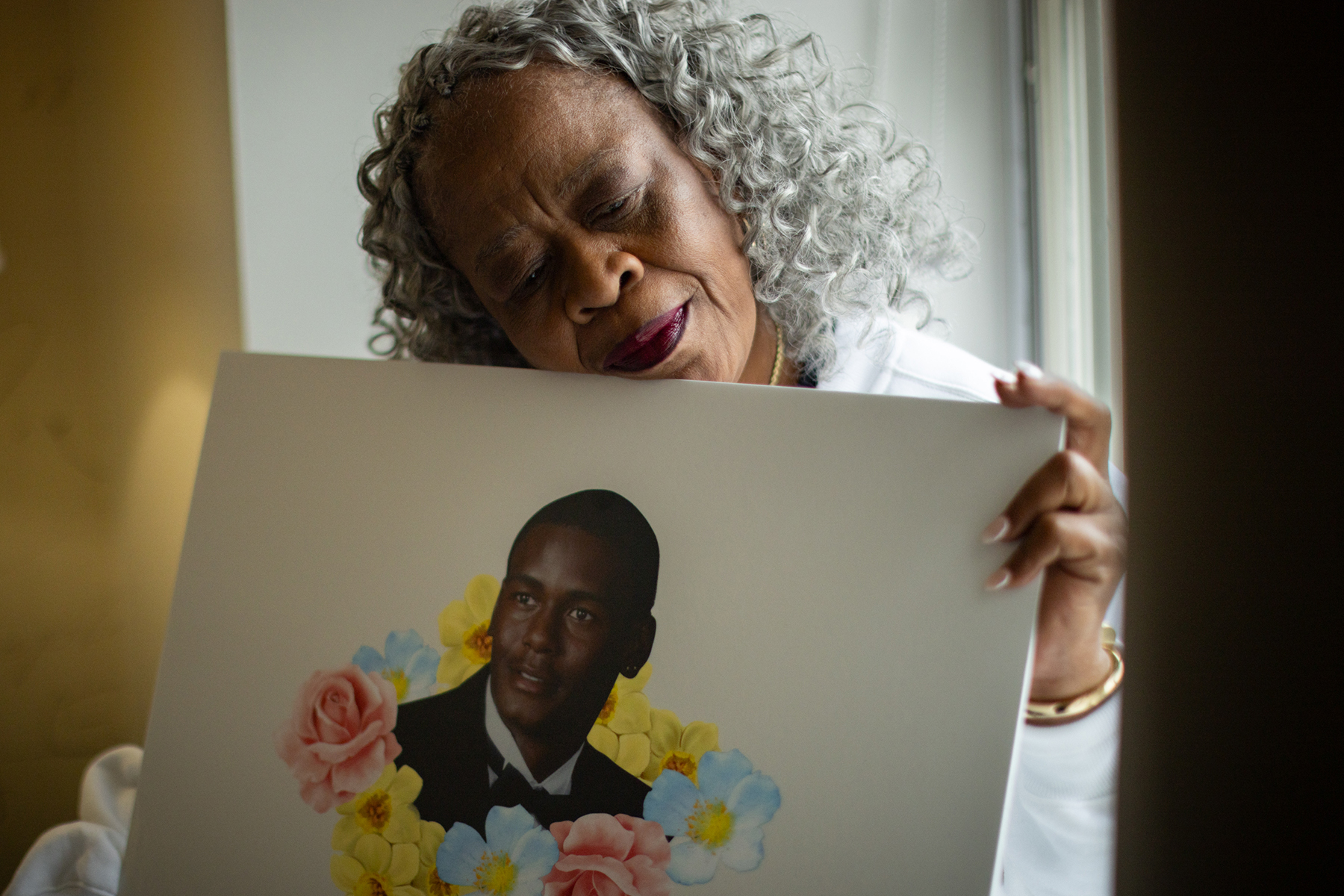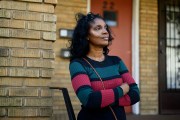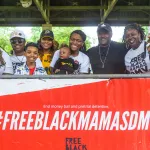Adrienne Hood sat back in her chair as she stared at the detective sitting across from her.
“I see your son wasn’t a felon,” he said casually, glancing down at the notebook in his hand.
It was June 8, 2016. Just two days prior, two plainclothes officers had fatally shot Hood’s 23-year-old son in Columbus, Ohio. Henry Green V — her “bubby,” as she calls him — was the person in the family to make everyone laugh. He loved to play basketball and taught himself how to dribble and shoot with his nondominant hand. He was a talented cook and had dreams of going to culinary school. Hood particularly loved Green’s meatball sauce. She never got the chance to write down the recipe.
Little of that appeared to matter to the police speaking with Hood about her son’s death, she said. Right away she sensed they were fishing for information they could use to paint a public image of her son as the aggressor.
“For probably two and a half years, I was just full throttle,” Hood told The 19th. “I knew that there was not going to be an opportunity for me to take a break or breathe, because I’m trying to rewrite this narrative that has been put out here now about my son.”
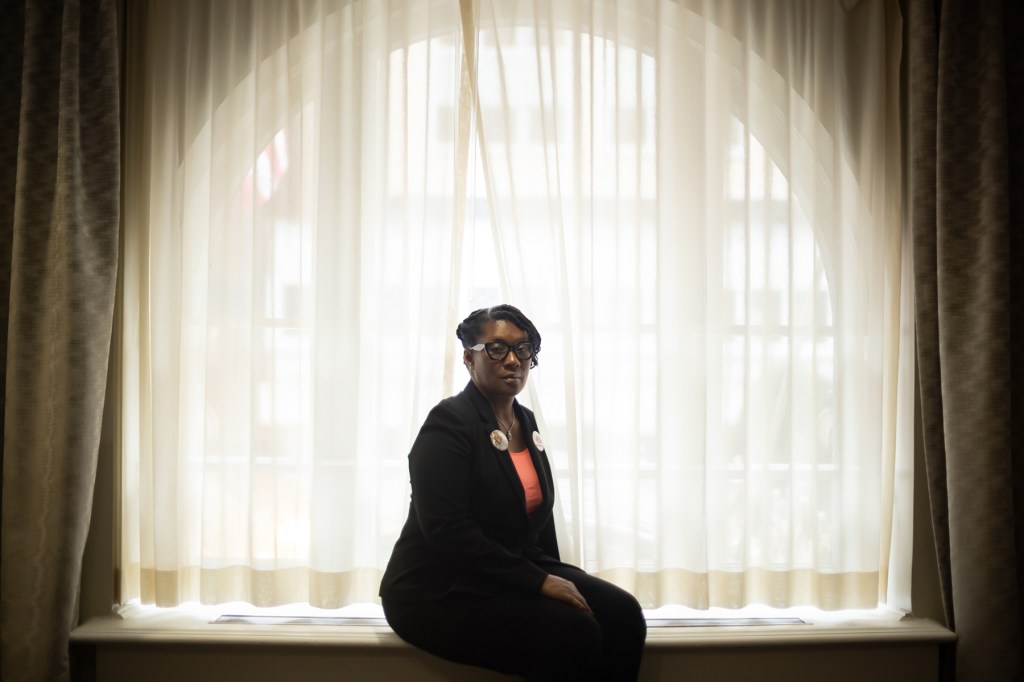
I’m trying to rewrite this narrative that has been put out here now about my son.”
Adrienne Hood
Black people represent nearly 30 percent of fatal police shooting victims in the United States, though they are 13 percent of the general population. Black women, particularly grieving mothers like Hood, have always been at the center of the movement for police reform: fighting for justice not only for their own children, but for a safer and more equal America for all. It was against that backdrop that Collette Flanagan founded Mothers Against Police Brutality (MAPB) after her 25-year-old son, Clinton Allen, was killed by a Dallas police officer 12 years ago.
Flanagan’s group gave Black and Brown women a platform to build collective power and demand change alongside the growing Black Lives Matter movement in 2014, and a reckoning around systemic racism and institutional inequality in 2020 that included calls for police reforms. In that time, MAPB has expanded its reach and now leads a fellowship legacy program training 10 women across five states for the next decade of organizing. Fellows attend sessions unpacking the law-making process and legal protections for police. They also learn strategies for interacting with elected officials, handling news interviews and using social media to raise public awareness.
The 19th spoke with the MAPB fellows, who expressed both pride in how their efforts have helped to shift conversations on race and policing, as well as disappointment in the current political moment. The work feels harder during President Donald Trump’s second term, as the administration moves to limit accountability for police, and erase data that is crucial for developing solutions. But the MAPB fellows remain resolute in their mission.
In sharing their own experiences navigating tragedy, MAPB fellows said they want to empower others and give them hope that change can happen, even when it’s incremental or feels out of reach.
“We just hope and pray that we will be able to find a way for these police officers to be held accountable for the pain and suffering they have caused these families,” said Kathy Scott-Lykes, an MAPB fellow who lives in Columbus, Georgia. “We hope that we will be able to say, ‘We did it. It’s finally happening.’ We want to be able to still be alive to see it happen.”
A note from reporter Candice Norwood
The story was made possible as a result of interviews with Janet Baker, Sheila Banks, Montye Benjamin, Jeralynn Brown-Blueford, Deborah Bush, Rosie Chavez, Adrienne Hood, Dalphine Robinson, Kathy Scott-Lykes and Anita Wills. You can read more about their stories here.
On the night of December 29, 2017, Scott-Lykes’ 35-year-old son, Jarvis Lykes, was driving to work when he approached a police DUI checkpoint. He turned around before reaching the checkpoint, catching the attention of a Georgia state patrol trooper who then pursued Lykes to a dead-end street. There is no dashcam or body cam footage, so it’s unclear exactly what led up to the shooting. Like Hood, Scott-Lykes felt that law enforcement wanted to portray her son as a villain, but she initially struggled with speaking publicly to tell the world about the Jarvis she raised.
“I was a nervous wreck. I couldn’t talk without crying. I couldn’t mention my son’s story without having emotional fallouts,” she said.
As a Black woman in America, Scott-Lykes heard stories of other Black people who lost their lives to police. But nothing could prepare her for when she lost her own son, she said. The grief and disbelief are only just the beginning. There’s planning funeral arrangements, addressing questions from media outlets, processing different accounts of what happened, securing a lawyer, gathering documents for a potential lawsuit, and learning the state and local laws to see what protections police may have.
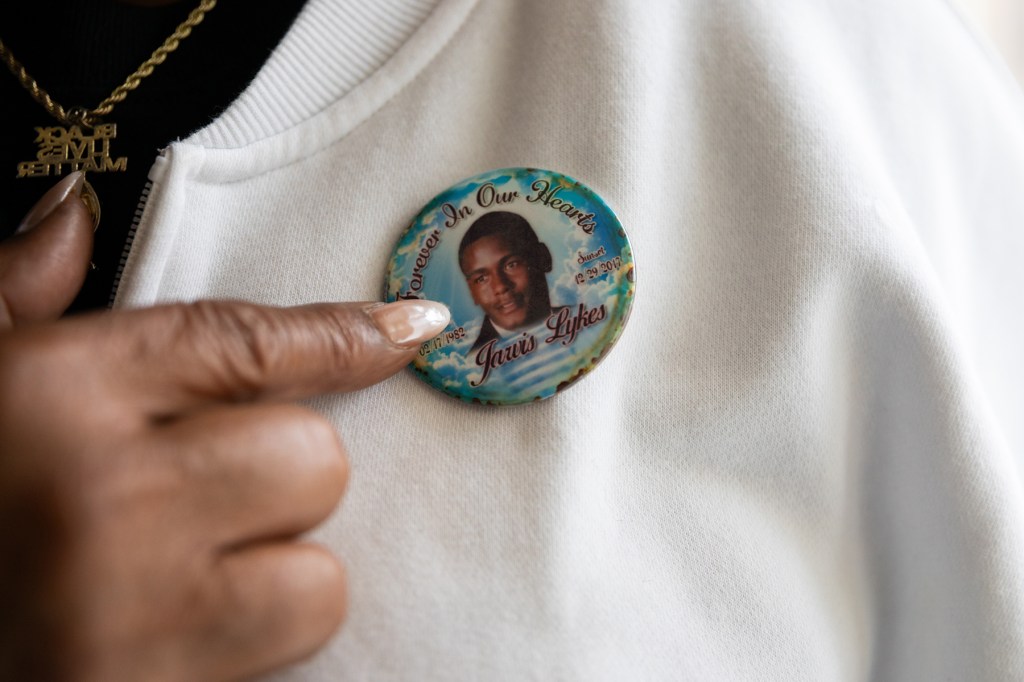
In Hood’s case, she learned that Ohio is a “home rule” state, which gives local governments greater power to self-govern and oversee police investigations. This prompted her to push for a new policy that would require independent probes into cases involving fatal police use-of-force. Though Hood could not secure an independent investigation for her son’s death, she continued to push for government action. Then, in 2020, the Columbus mayor signed an order mandating that all police-involved deaths be referred to the Ohio Bureau of Criminal Investigation.
“It didn’t happen for me, but I wasn’t gonna stop it from happening for somebody else’s family,” Hood said. “It was not until this city got torn to pieces during the George Floyd protests that our mayor signed an executive order.”
Jeralynn Brown-Blueford lost her son on May 6, 2012. Alan Blueford, 18, was standing with two other teens on the sidewalk when two officers with the Oakland Police Department approached them with suspicions that they might be up to something illegal. The officers ordered the teens to sit on the sidewalk, according to a report released by the district attorney’s office following an investigation. After sitting for some time, Blueford reportedly tried to leave the area with officer Miguel Masso behind, chasing him on foot. Ultimately, Masso shot Blueford three times.
Police initially claimed that Blueford had a weapon and initiated a gunfire exchange that also injured Masso. The department later admitted that Blueford did not fire a gun and that Masso shot himself in the foot. Brown-Blueford and her family pushed for months to get an investigation and a comprehensive report about the shooting, but faced stonewalling from the department, she said.
“It took protests. It took several months at the city council meetings, it took filing a lawsuit, they just tried to stop us at every turn,” Brown-Blueford said. When they finally did get a police report, it was redacted, she said, “so the few little details that they did leave were not helpful to us.”
The nonprofit newsroom The Oaklandside obtained a November 2013 letter addressed to Masso and signed by the Oakland police chief stating that Masso would be suspended without pay for three working days after an internal investigation found a “preponderance of evidence” that indicated he used “improper tactics” in his pursuit of Blueford. But Masso never faced criminal prosecution. In declining to move forward with the case, prosecutors argued at the time that the officer “reasonably believed that his life was in danger.”
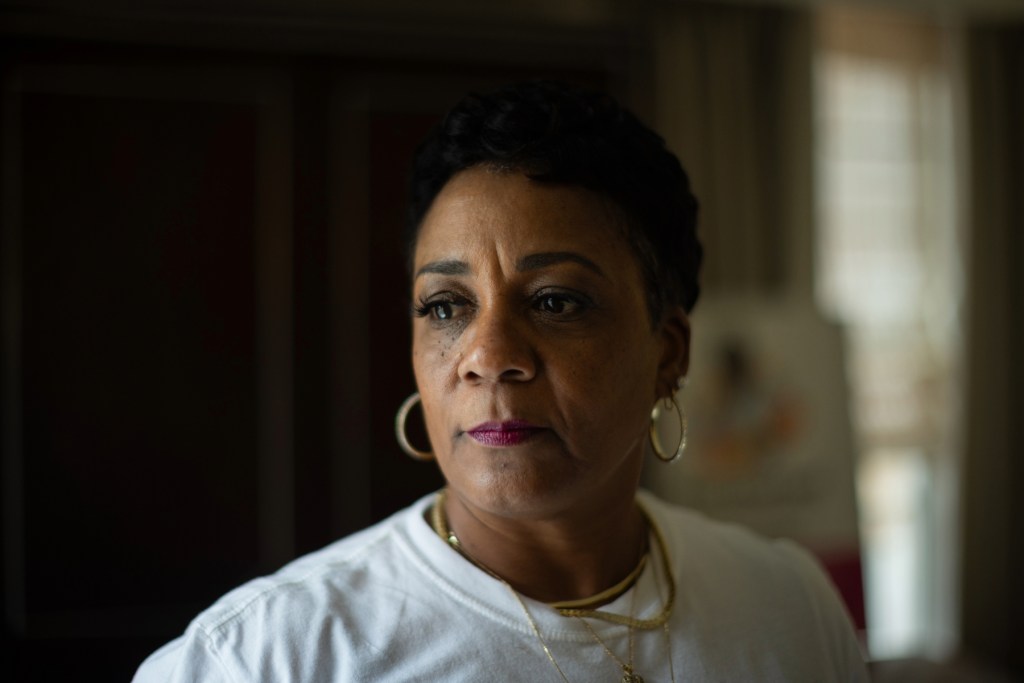
It took protests. It took several months at the city council meetings, it took filing a lawsuit, they just tried to stop us at every turn.”
Jeralynn Brown-Blueford
Blueford’s killing happened two years before Black Lives Matter and nationwide demonstrations forced state and local officials to reconsider policies that allow police misconduct to go unchecked. But legal pressures from families and civil rights organizations led to changes that have helped to give Brown-Blueford some answers.
A 2019 law in California made certain police misconduct records publicly accessible. The following year, the American Civil Liberties Union of New York City obtain the misconduct complaint database, showing that Masso — who worked at the New York Police Department before moving to Oakland — faced 14 complaints in a two-year period at the NYPD. An investigation by the New York City Civilian Complaint Review Board found three of the 14 complaints to be substantiated, including taking retaliatory action against someone who had previously filed a complaint against him. Masso was not disciplined for any of the substantiated complaints.
Since her son’s death, Brown-Blueford has learned that Masso’s ability to freely move from department to department with a record of misconduct was not an isolated incident. In recent years, reports have revealed instances of officers with disciplinary records being fired by one department and hired by another. Activists have pushed for centralized databases to track police misconduct; they have also called for professional police licensing systems where states can revoke or decertify officers when they commit offenses.
-
Read Next:
In 2021, the California legislature passed the Kenneth Ross, Jr. Police Decertification Act, which established a statewide system to decertify or suspend officers who have committed serious misconduct.
Other changes happened throughout the country. State and local jurisdictions moved to ban the use of chokeholds, neck restraints and no-knock warrants that result in the deaths of people like George Floyd and Breonna Taylor. More officers have faced criminal charges, though prosecutions and convictions remain rare: Less than 3 percent of civilian deaths at the hands of police lead to criminal prosecutions.
Sheila Banks’ family is one of the few to receive that closure. Corey Jones, her 31-year-old nephew and godson, was killed by officer Nouman Raja 10 years ago in Palm Beach Gardens, Florida. Jones’ mother died in 2006 when he was 22, which took a toll on his mental health, Banks said.
“It really kind of destroyed him,” she said. “He was just getting back to himself. He joined a band and that was the band that he had his last performance with before his life was taken.”
Jones was driving home from performing the early morning of October 18, 2015, when his car broke down and he had to call a tow truck. While Jones waited on the side of the road, an officer pulled over beside him wearing a normal t-shirt and jeans and driving an unmarked van.
Police accounts claimed that Raja was “confronted by an armed subject,” but Jones’ family disputes this. While Jones did own a legally registered gun, Banks said, there were a number of details that didn’t add up. Raja reportedly described Jones to a dispatcher as a Black male with dreadlocks and a gun in his right hand. Jones was left-handed and had a low haircut, Banks said.
The exchange ended when Raja fired at Jones six times, hitting him three times. Raja was not wearing a body camera and did not have a dashboard camera on his vehicle. Jones happened to be on the phone with a roadside assistance service, which recorded the minutes leading up to and during the shooting and confirmed that the officer never identified himself as police.
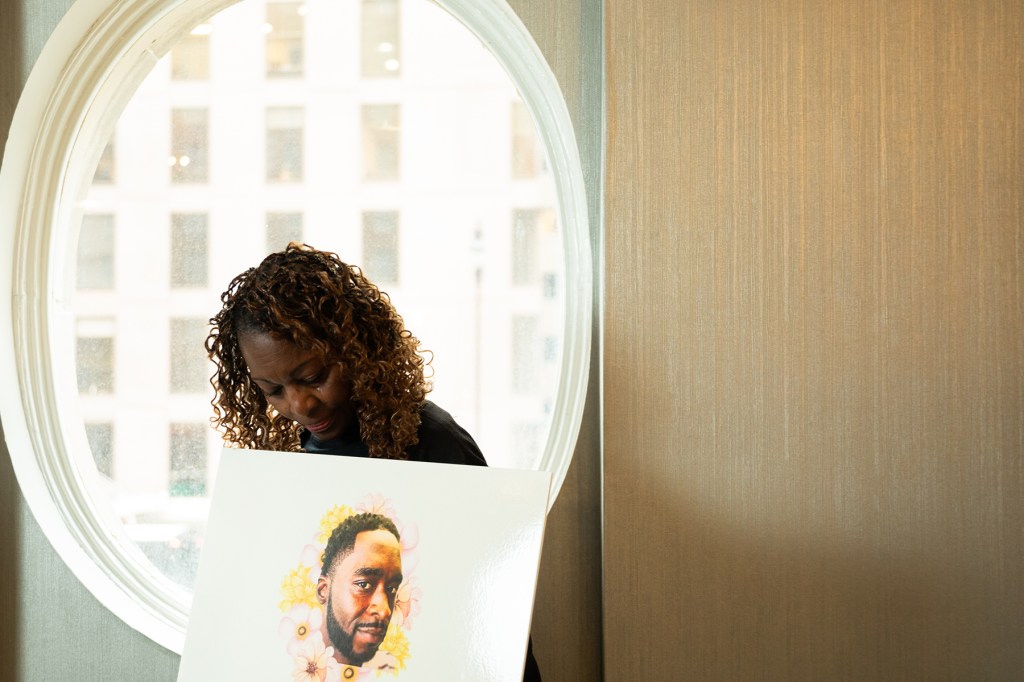
We met with any and everybody we could meet with to help us get justice.”
Sheila Banks
Banks said she found strength in meeting with other families facing similar tragedies, and she quickly became a public spokesperson for her family.
“We started traveling. We started in D.C. We went with community leaders. We went from D.C. to Tallahassee, and then we came back locally,” Banks said. “We met with the late [Rep.] Alcee Hastings, we met with any and everybody we could meet with to help us get justice.”
Raja was arrested on June 1, 2016, but wasn’t convicted until three years later. He was sentenced to 25 years in prison. Banks understands that the outcome in her family’s case is the exception and not the norm — she knows families who have not received an official police report 10 or 15 years in. Now, Banks tries to pass on the kind of support that others offered to her 10 years ago. She meets with mothers and family members, shares her experiences and what she’s learned from the legal process and the MAPB fellowship.
“Sometimes you feel a little guilty because there’s so many other families that haven’t gotten justice or haven’t gotten their day in court,” she said. “Sometimes I can’t rejoice out loud.”
National attention on police brutality rushes in and fades away like waves, until another death sparks public outcry. Activists Alicia Garza, Patrisse Cullors and Ayọ Tometi created the Black Lives Matter hashtag on social media in 2013 after the killing of Trayvon Martin by a civilian in Florida. The slogan gained national prominence a year later when an officer killed Michael Brown, igniting the Ferguson uprisings in Missouri. The movement grew and gained international visibility in the aftermath of George Floyd’s 2020 killing in Minnesota.
Many hoped that the racial reckoning of 2020 would mark a major shift in public policy to address mass incarceration, overpolicing and economic inequality that all disproportionately affect Black and Brown communities. States collectively passed nearly 300 police reform bills within the first two years after Floyd’s killing, according to an analysis by the Howard Center for Investigative Journalism at the University of Maryland.
But over time, the Black Lives Matter hashtags disappeared from Instagram posts, companies began to cut back on diversity programs and lawmakers fell silent on calls for police reform. Some returned to supporting tough-on-crime legislation.
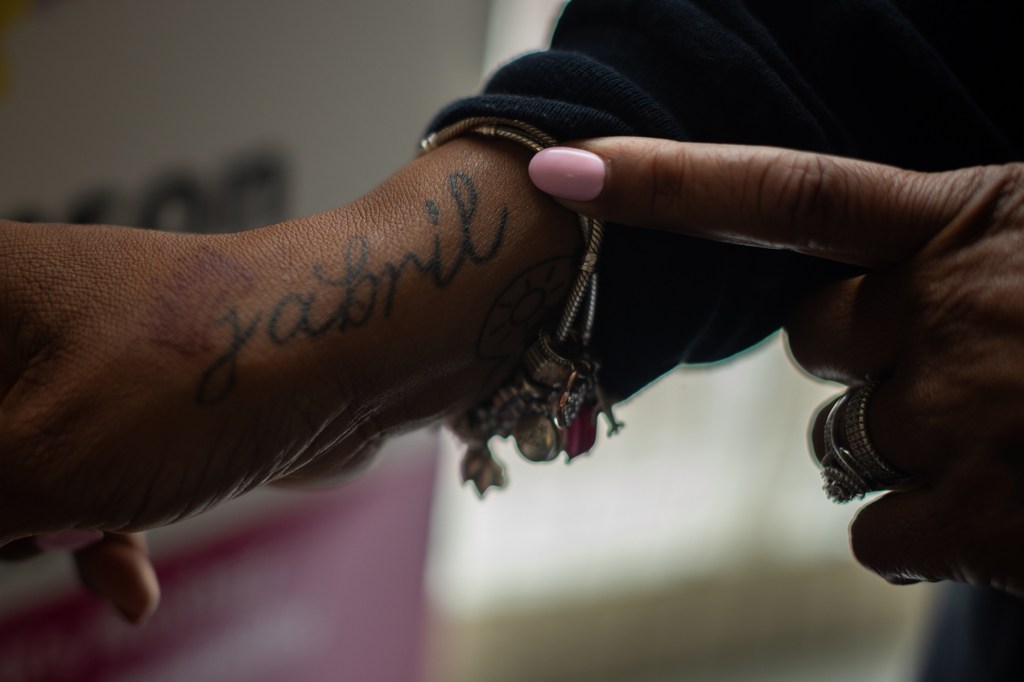
This week, the Department of Justice announced that it would begin the process of dismissing orders against police departments in Louisville, Kentucky, and Minneapolis that aimed to address patterns of civil rights violations. And last year the Louisiana governor signed a bill to strengthen qualified immunity, making it harder to sue officers for misconduct. Tennessee’s governor also signed a bill blocking cities from implementing some police reforms. Even jurisdictions viewed as more politically progressive like Portland, Oregon, and Los Angeles restored police funding cut after Floyd’s killing.
In September 2020, 76 percent of U.S. registered voters listed race relations as a “very important” or “important” consideration for their vote, according to a Gallup poll. Four years later, that number fell to 56 percent.
“I feel like, to a degree, it is kind of going backwards instead of forward. Now we’re having to start all over again,” said Montye Benjamin. Jayvis Benjamin, her 20-year-old son, was killed by police in DeKalb County, Georgia, in 2013. “Looking from then to now — even with George Floyd — and then considering who we have in the U.S. House and all of the changes that [President Donald Trump] has made. It’s at a standstill.”
As Benjamin and other members of Mothers Against Police Brutality prepared for an advocacy trip to Washington, D.C., this March, they braced for a potentially hostile environment. Within the first two months of his second term, Trump led a robust effort to eliminate diversity and inclusion programs, as well as any government policies with references to racial or gender inequities.
While in D.C., the women led a rally and spoke with members of Congress about their support for a bill introduced by Rep. Ayanna Pressley, a Massachusetts Democrat, seeking to limit qualified immunity protections for government officials, including police officers. The measure has been introduced in each session of Congress since 2020 but has never proceeded to a vote.
Despite some nerves leading up to the D.C. trip, MAPB fellows said they found the lawmakers they spoke with to be warm and receptive to hearing their stories. But they are uncertain whether that will translate into action.
“I need to see more representatives, especially state reps and county reps, be more hands on with bringing together programs that could bridge the gap between police officers and the community,” said Dalphine Robinson, the mother of 23-year-old Jabril Robinson, who was killed by Clayton County Police in Georgia in 2016. “I also feel like qualified immunity needs to be dismantled. If the police know that they will be held accountable, or they could spend the rest of their life in prison, or their pensions could be taken away from them, I feel like they would think twice.”
In this quiet period when police reform has less national spotlight, MAPB members said they remain committed to their work, even if it requires a different approach. Banks said it is a time to reflect and strategize, adding that she thinks Democratic leaders in federal government don’t have much ability to take action on police reform without control of the White House and Congress.
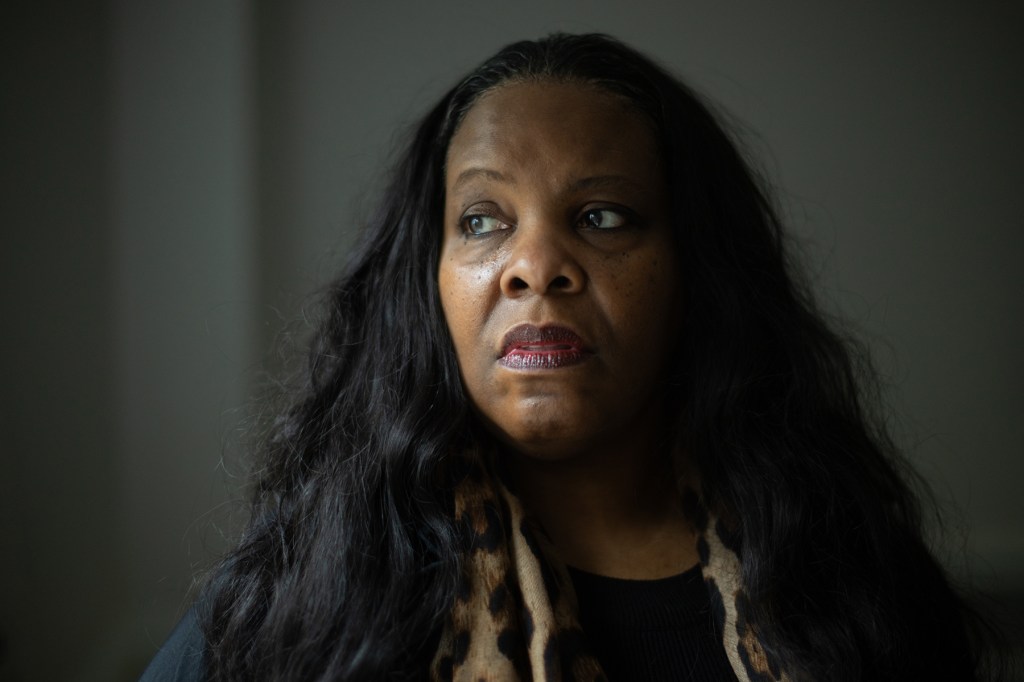
The strategy now is to just keep working, keep moving, keep trying, keep focusing on our loved ones.”
Janet Baker
Janet Baker, whose 26-year-old son, Jordan Baker, was killed by an off-duty Houston police officer in 2014, thinks part of today’s organizing strategy has to recognize that many people are desensitized and overwhelmed by the current political climate. She thinks it’s important for MAPB and other groups to find ways to work together rather than operating in silos.
“I’m realistic, I know there will be others, and it’s just so unfortunate that is our reality,” Baker said. “But through each occurrence and each year, each decade, there’s something that we learn a little bit more. The strategy now is to just keep working, keep moving, keep trying, keep focusing on our loved ones.”
